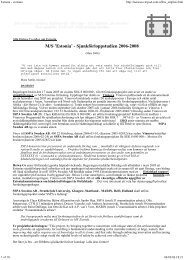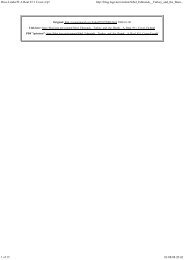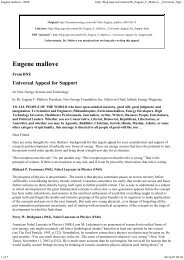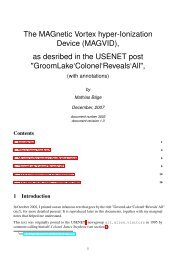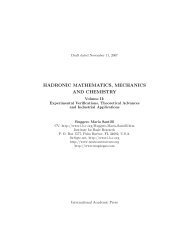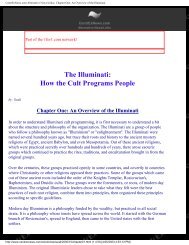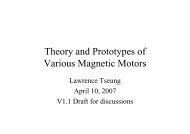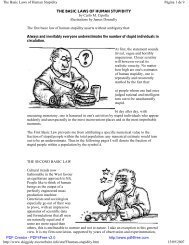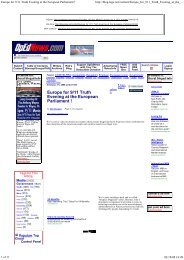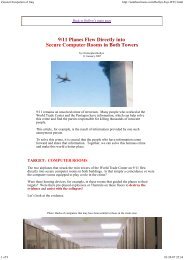Create successful ePaper yourself
Turn your PDF publications into a flip-book with our unique Google optimized e-Paper software.
<strong>TBR</strong><strong>News</strong>.org http://blog.lege.net/content/TheVoiceOfTheWhiteHouse<strong>2008</strong>08<strong>18</strong>.html<br />
guard whatsoever."<br />
The "enormous arsenals" are American-made or American-supplied. American money,<br />
know-how, planning, and equipment built these bases as part of Washington’s drive to bring<br />
NATO membership to a small country that is Russia’s underbelly.<br />
The American "train and equip" mission for the Georgian military is six years old. It has<br />
been destroyed in as many days. And with it, Georgia’s NATO ambitions. "There are a few<br />
countries that will say ’told you so’" about the need to get Georgia into NATO," said Andrew<br />
Wilson, Russia expert at the European Council on Foreign Relations. "But many more will want<br />
to walk away from the problem. And for the next few years, Georgia will be far too busy trying to<br />
pick itself up."<br />
If Georgia and NATO are the principal casualties of this week’s ruthless display of brute<br />
power by Vladimir Putin, the consequences are bigger still, the fallout immense, if uncertain. The<br />
regional and the global balance of power looks to have tilted, against the west and in favour of the<br />
rising or resurgent players of the east.<br />
In a seminal speech in Munich last year, Putin confidently warned the west that he would<br />
not tolerate the age of American hyperpower. Seven years in office at the time and at the height of<br />
his powers, he delivered his most anti-western tirade<br />
Pernicious<br />
To an audience that included John McCain, the White House contender, and Robert<br />
Gates, the US defence secretary and ex-Kremlinologist, he served notice: "What is a unipolar<br />
world? It refers to one type of situation, one centre of authority, one centre of force, one centre of<br />
decision-making. It is world in which there is one master, one sovereign. This is pernicious ...<br />
unacceptable ... impossible."<br />
This week, he turned those words into action, demonstrating the limits of US power with<br />
his rout of Georgia. His forces roamed at will along the roads of the Southern Caucasus, beyond<br />
Russia’s borders for the first time since the disastrous Soviet occupation of Afghanistan in the<br />
1980s.<br />
As the Russian officers sat on the American stockpiles of machine guns, ammunition,<br />
and equipment in Gori, they were savouring a highly unusual scenario. Not since the Afghan war<br />
had the Russians seized vast caches of US weaponry. "People are sick to the stomach in<br />
Washington," said a former Pentagon official. And the Russians are giddy with success.<br />
Celebrating the biggest victory in eight years of what might be termed Putinism, the<br />
dogged pursuit by whatever means to avenge a long period of Russian humiliation and to deploy<br />
his limited range of levers - oil, gas, or brute force - to make the world listen to Moscow, the<br />
Russian prime minister has redrawn the geopolitical map.<br />
In less than a week, Putin has invaded another country, effectively partitioned Georgia in<br />
a lightning campaign, weakened his arch-enemy, President Mikheil Saakashvili, divided the west,<br />
and presented a fait accompli. The impact - locally, regionally, and globally - is huge.<br />
"The war in Georgia has put the European order in question," said Alexander Rahr, one<br />
of Germany’s leading Russia experts and a Putin biographer. "The times are past when you can<br />
punish Russia."<br />
That seems to be the view among leading European policymakers who have been<br />
scrambling all week to arrange and shore up a fragile ceasefire, risking charges of appeasing the<br />
Kremlin. "Don’t ask us who’s good and who’s bad here," said Bernard Kouchner, the French<br />
foreign minister, after shuttling between Tbilisi and Moscow to try to halt the violence. "We<br />
shouldn’t make any moral judgments on this war. Stopping the war, that’s what we’re interested<br />
in."<br />
His boss, President Nicolas Sarkozy, went to the Kremlin to negotiate a ceasefire and<br />
parade as a peacemaker. Critics said he acted as Moscow’s messenger, noting Putin’s terms then<br />
taking them to Tbilisi to persuade Saakashvili to capitulate. Germany also refused to take sides<br />
while Italy warned against building an "anti-Moscow coalition".<br />
That contrasted with Gordon Brown’s and David Milliband’s talk of Russian<br />
"aggression" and Condoleezza Rice’s arrival in Tbilisi yesterday to rally "the free world behind a<br />
free Georgia".<br />
12 of 24 08/19/08 13:13



